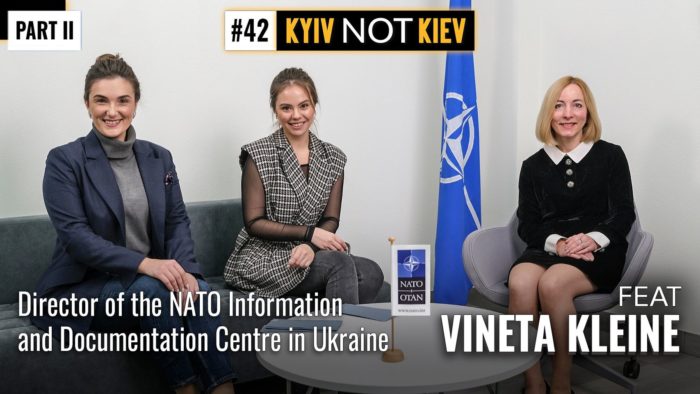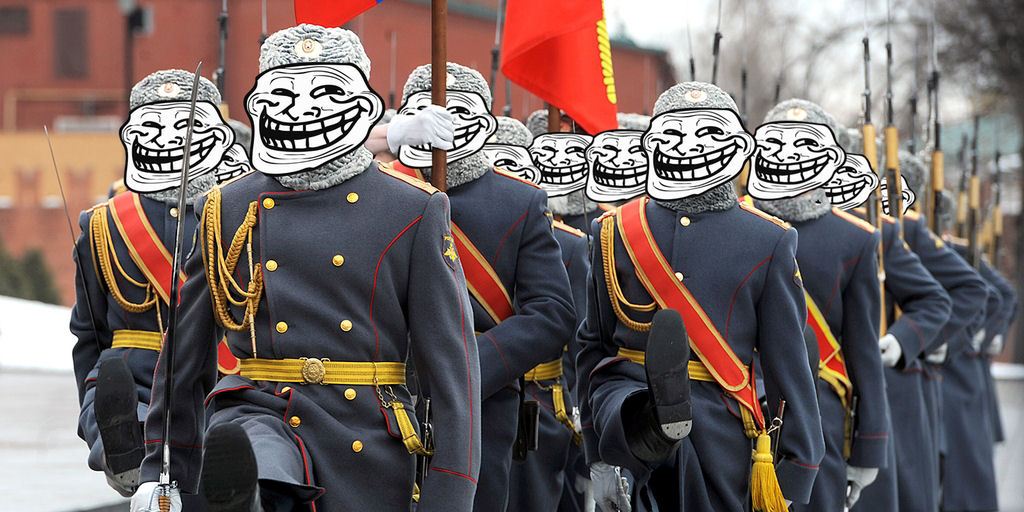You can read Part 1 here.
3D holograms or how NATO Information and Documentation Centre approaches work in 2022
The NATO Information and Documentation Center in Ukraine (NIDC) was established in 1997. The Center is a structural unit of the Public Diplomacy Office at NATO Headquarters and was the first NATO information institution in a Partner country to provide open access to information to the general public.
Since its opening, the Center has managed to build a wide and strong network of partners in Ukraine to assist in its reforms path. Ms. Vineta Kleine, Director of NATO Information and Documentation Center in Ukraine, in the second part of the interview with Kyiv Not Kiev, highlighted that they wouldn't be able to do even 5% of what they are doing not having great Ukrainian partners.
The Center works with academia, civil society, media, universities, and government institutions. Recently, with the development of information technology, NATO has also stepped up to convene its activities through modern technological inventions. Not so long ago, the Center launched 3D holograms project together with Canadian and British embassies.
NIDC is also running NATO spring and autumn academies using games and other interactive tools to explain how decisions are taken at NATO. In these academies, students express their opinion and vision on international topics in an essay contest.
“This year, we implemented a radio marathon project. We ask simple questions about NATO and then get phone calls in the studio. The learning process is much more enjoyable when we do it creatively and when we are all just open and have fun doing it,” said Ms. Kleine.
“There can be no 'red lines' from a third party”
Lately, everybody sought to hear from NATO officials that Ukraine is about to become a member of the Alliance. This question is raised by both the President of Ukraine and ordinary citizens. Given the tense situation in which we are today, it was some kind of demand for security assurances. At the same time, the President of Russia speaks about some "red lines" that Ukraine and the Alliance allegedly have no right to cross. What are these lines and is there really an unwritten law under which Ukraine still remains outside the bloc?
“At the 2008 Bucharest summit," starts explaining Ms. Kleine, "NATO’s Heads of states and governments announced that both Ukraine and Georgia will join NATO. We stand by this decision. It has been also reiterated afterward. What is important is that Ukraine continues with its reform incentives and efforts.”
Regarding the said “red lines,” Ms. Vineta Kleine reiterated the statement of NATO Secretary-General Jens Stoltenberg: the Alliance is not going to revert to the past where there were red lines. It’s up to aspiring countries and NATO member states to decide who will join the Alliance. There can’t be any red lines imposed by a third party. So, eventually, each state has the right to choose its security arrangements and to decide what organization a particular country would like to join.
Putin’s offer to “stop NATO expansion”: the reason behind Russia’s month of aggression
“Nothing has been better than NATO. That’s why it’s easy to talk about and advocate for NATO principles and values because nothing can replace democracy, the rule of law, and freedom of speech.”
Ms. Kleine is often asked why Ukraine, having implemented so many NATO standards, is still not accepted to the Alliance. She emphasized that although NATO and Ukraine share common values, it’s also equally important how the rule of law is ensured in the country, as well as how democratic oversight over the security and defense sectors is implemented.
Ms. Vineta Kleine herself comes from Latvia. She worked in the country's Ministry of Deference when it was on the way to join the Alliance:
“We had to go through a solid reform process and we were very determined. I remember the time I was working at the Ministry of Defense. I know how much effort it takes and how focused we were to complete our reforms and to show that we are prepared and ready to take on our commitments as a NATO member state.”
Latvia joined NATO in 2004, and since then the level of security in the region has increased. Today, Ms. Kleine's homeland systematically supports Ukraine along with other Baltic states. Latvia supports providing Ukraine with a Membership Action Plan, given the increasing concentration of Russian forces on the border with Ukraine.
Successes on the strategic communications front
The world must hear Ukraine’s story. However, this is impossible without strong strategic communications, says Vineta Kleine. To enhance Ukrainian capacity in this area, the NATO-Ukraine Strategic Communications Partnership Roadmap was signed in September 2015.
Since then, the Roadmap has repeatedly proven its effectiveness. However, there is still plenty of work at the NIDC.
“A couple of months ago, we organized trainings for security and defense sector institutions on how to communicate with audiences, how to develop a strategic communications strategy, how to reach out and build up a message or how to build up a narrative,” said Ms. Kleine.
Thanks to the Roadmap, Ukraine was able to establish close cooperation with the NATO Strategic Communications Center of Excellence in Riga. Founded in 2014, the Center has currently become a real hub of knowledge, experience, and high-quality analytics for NATO members and partners. Ukraine is one of them.
The Far Side of NATO
NATO is not just about military power. Arts and cultural diplomacy have always been an integral part of the Alliance's life. It may be unknown to the average citizen, but in pre-Covid times one could regularly visit exhibitions or even concerts in the halls of NATO HQ in Brussels. A small part of this was brought to Ukraine.
“When in 2018 we moved to our new office we looked at the walls and thought: We can use our walls for offering to Ukrainian artists exhibit their arts and their paintings there,” recalled Ms Kleine.
What NIDC plans for 2022
For 2022, the NIDC has planned a lot of interesting things, admits Vineta Kleine. In particular, there will be two mega-events: NATO Tide Hackathon 2022 (last year, the Ukrainian team managed to win in the Medical Information Management category) and the NATO Parliamentary Assembly session to be hosted in Ukraine.
In general, NATO, namely, its Public Diplomacy Division, holds an annual grant competition involving Ukrainian non-governmental organizations and civil society. The next selection stage will start soon.
“We invite everyone to submit their proposals. We are looking for creative and innovative ideas. People should remember that NATO is here to support Ukrainians and that our support is both political and practical,” summed up Ms. Vineta Kleine.
Victoria Dubiv is a Project Manager at TRUMAN, Editor at Kyiv Not Kiev
Read More:
- Four ways NATO can help Ukraine resist Russian aggression
- Russia now wants NATO out of Bulgaria, Romania, and 12 other countries
- Ukrainians ask to personally join NATO, offer private land for NATO base
- US House Republicans propose designating Ukraine a “NATO Plus” country, sanctioning Nord Stream 2
- Epidemic of hoax bomb threats in Ukraine part of Russia’s hybrid war, emergency service says
- Is Ukraine getting closer to NATO membership?
- NATO officially gives Ukraine aspiring member status; membership action plan is next ambition (2018)





